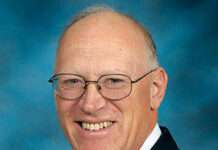Kumar’s research has helped farmers throughout Kansas, Great Plains
HAYS, Kan. – A weed science researcher at the Kansas State University Agricultural Research Center whose work has helped boost dryland cropping systems in the Great Plains region has received an early career award from the North Central Weed Science Society.
Vipan Kumar, an assistant professor of weed science, received the Young Scientist award during the NCWSS annual meeting, which was held online this year.
The award honors a weed scientist working in the public sector who has made outstanding contributions to the field within 10 years after receiving a terminal degree. While the award has been given since 1990, Kumar is just the sixth young scientist to have received the award in the previous decade, and the 21st in the history of the award.
“It is a humbling experience and I do feel honored and excited,” said Kumar, a native of the Punjab state in northwestern India. “This recognition also brings a sense of more responsibility to contribute further to weed science and the farming community.”
Since beginning work at the Agricultural Research Center in 2017, Kumar has secured more than $2.7 million in extramural grants and contracts to conduct research, which includes many weed-related topics but specifically focuses on herbicide-resistant Palmer amaranth and kochia – two aggressive weeds that steal water and nutrients in Kansas cropping systems.
In 2019, Kumar’s research team confirmed the first report on a strain of Palmer amaranth in central Kansas that resists the 2,4-D herbicide, one of the most commonly used broadleaf weed killers.
Kumar’s research program focuses on improving understanding of the biology and ecology of problematic weeds to develop cost-effective, integrated weed management (IWM) strategies in dryland cropping systems; developing innovative and sustainable IWM approaches to manage herbicide resistance; and understanding weed population dynamics in agroecosystems.
An avid scholar, he has published 44 peer-reviewed scientific articles, 23 extension/technical bulletins and 114 abstracts in conference proceedings, and delivered several invited presentations in various grower, commodity and industry meetings. Earlier in 2020, he also received an Outstanding Reviewer award from the Weed Science Society of America; and Outstanding Weed Scientist-Early Career award from the Western Society of Weed Science.
Kumar serves as associate editor for Weed Science, Weed Technology, and Agronomy journals and has served as chair and member of several committees in the Western Society of Weed Science, North Central Weed Science Society and Weed Science Society of America.
Though his appointment with K-State is for 100% research, he has also contributed to the university’s extension mission by hosting and participating in numerous educational programs for growers in Kansas. Those include the annual Weed Management Field Day, Crop Pest Management Schools, Weed Schools and Multi-State weed research groups for mitigating herbicide resistance in the Great Plains region.
“These awards motivate me day to day and further encourage me to give my best in helping Kansas growers with weed-related issues,” Kumar said.
More information about weed science and other programs at the K-State Agricultural Research Center in Hays is available online.
FOR PRINT PUBLICATIONS: Links used in this story
North Central Weed Science Society, http://ncwss.org
K-State Agricultural Research Center (Hays), www.hays.k-state.edu
K State Research and Extension is a short name for the Kansas State University Agricultural Experiment Station and Cooperative Extension Service, a program designed to generate and distribute useful knowledge for the well being of Kansans. Supported by county, state, federal and private funds, the program has county extension offices, experiment fields, area extension offices and regional research centers statewide. Its headquarters is on the K State campus in Manhattan. For more information, visit www.ksre.ksu.edu. K-State Research and Extension is an equal opportunity provider and employer.
For more information:
Vipan Kumar
[email protected]
Story by:
Pat Melgares
785-532-1160
[email protected]





